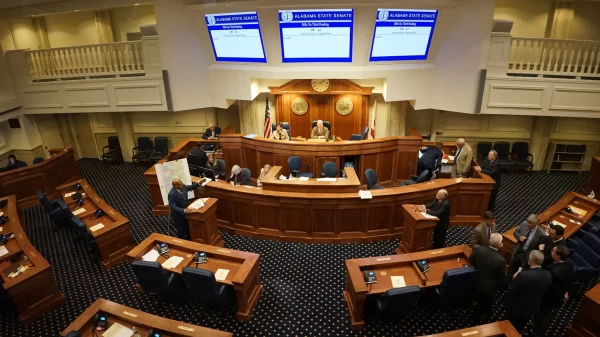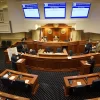The Alabama House of Representatives passed the education trust fund budget Tuesday.
Senate Bill 199 is sponsored by State Sen. Arthur Orr, R-Decatur.
The bill was carried on the House floor by State Rep. Bill Poole, R-Tuscaloosa, who chairs the House Ways and Means Education Committee.
Poole’s committee substituted the budget that came down from the Senate with their own version of the budget and the House voted to pass that substitute budget.
At $7.1 billion, this is the largest education budget in the history of the state, but Poole warned that funding will not fix all the issues with education in Alabama.
Poole said the budget provides a 4 percent pay increase to all education employees in the state.
“That is a 10 percent increase over the last four years,” Poole said.
“I am a little disappointed that retired educators are not in this budget,” said House Minority Leader Anthony Daniels, D-Huntsville. “I don’t want to ever forget our retirees and the work that they have done.”
“There is an acute need there,” Poole said. “We need a plan that is sustainable.”
“There has been a significant increase in pre-K,” Daniels said. “That is one of the priorities of our caucus.”
“You have done a fantastic job from day one as chair of the Education Budget Committee,” said State Rep. Alan Farley, R-McCalla.
Poole said the community college system is getting $28 million in additional money. That is a 7.5 percent increase in the budget. He also said the community college system is also getting a supplemental appropriation of $26 million and a second supplement appropriation for total new dollars of $55 million.
State Rep. Brett Easterbrook, R-Four Points, praised Poole for cutting the appropriation for the Alabama Charter Schools Commission to $300,000 from the $500,000 in the Senate budget and suggested that it be cut further.
Easterbrook cited a disagreement about a charter school application in Washington County and concerns about the operations of the committee.
“We fund reading coaches through the Alabama Reading Initiative,” Poole said. “The reading initiative picks up about $7 million.”
“I want all of the members to know how methodical this process has been,” said State Rep. Barbara Drummond, D-Mobile.
State Rep. Pebblin Warren, D-Tuskegee, said the Senate budget had $30 million in it for expanding broadband, now it is down to $8 million.
Poole said they would talk about it in the conference committee.
Poole said while every college in the state got an increase in this budget, they still have some colleges that are not funded at 2008 level yet. Some colleges and universities have a dire need for facilities repair and modernization.
State Rep. Danny Garrett. R-Trussville, said this budget addresses the pre-K, K-12, and the community colleges. He said it was a very balanced process.
State Rep. Laura Hall, D-Huntsville, asked what they plan on doing about a COLA for retirees.
A COLA is a cost of living adjustment.
“For years we have structured our retirees benefit as a defined benefit,” Poole said.
“We have not funded COLAs over the decades,” Poole said. “If we were going to offers COLAs then both the employees and employer should have paid more. A one percent COLA for retirees would cost $221 million. The budget cannot sustain that. We are still paying for previous COLAs. They cost us over $one billion and estimates as high as $2 billion.”
“We have to have a funding source,” Poole said. “If we granted a COLA today that would increase the unfunded liability on the retirement system.”
State Rep. Thomas Jackson, D-Thomasville, dismissed a Senate proposal to offer a one time bonus for retirees with a conditional appropriations a: “Hoax the money was not there.”
Poole said a conditional appropriation is against the law
State Rep. Steve Hurst, R-Munford, spoke in favor of COLAs for retirees.
“We want to do everything that we can do, so that they will be strong for the kids,” Hurst said.
Hurst also spoke against Charter schools because he said the money follows the child, and that decreases the amount of money to the public school they left.
Hurst also spoke against the “failing schools” list because that tags will follow the students.
Hurst said most people in Alabama favor starting the school year on Labor day and ending it on Memorial Day.
Poole agreed that it is time to revisit the school year.
The House ETF budget included a $26.8 million increase in to expand Alabama’s voluntary First Class Pre-K program and help ensure its teachers receive a pay raise at the same level as other public school educators.
The House-approved version of the budget brings the overall amount of funding for First Class Pre-K (Office of School Readiness) to $122.8 million. The increase will enable the Alabama Department of Early Childhood Education to create around 200 additional classrooms and raise the total percentage of four-year-old children enrolled in the program from 32 to nearly 40 percent.
The Alabama School Readiness Alliance’s business-led Pre-K Task Force applauded the vote.
“Today’s vote shows that Governor Ivey, the Alabama State Senate and the Alabama House of Representatives are all in agreement that our state should provide more families with the opportunity to voluntarily enroll their child in the nation’s highest quality pre-kindergarten program,” said Bob Powers and Mike Luce, co-chairs of the Alabama School Readiness Alliance Pre-K Task Force in a statement. “We would like to thank Chairman Poole and his committee for prioritizing additional pre-k funding in this year’s budget.”
The ASRA Pre-K Task Force consists of more than 60 prominent leaders from the business, education, civic, medical, legal, philanthropic, military and child advocacy communities.
The House passed their own version of SB199 so it must go back to the Senate. The Senate is expected to non-concur. The two bodies must work out their differences in the Education Trust Fund budget in a conference committee before it can go to Gov. Kay Ivey for her signature.





















































